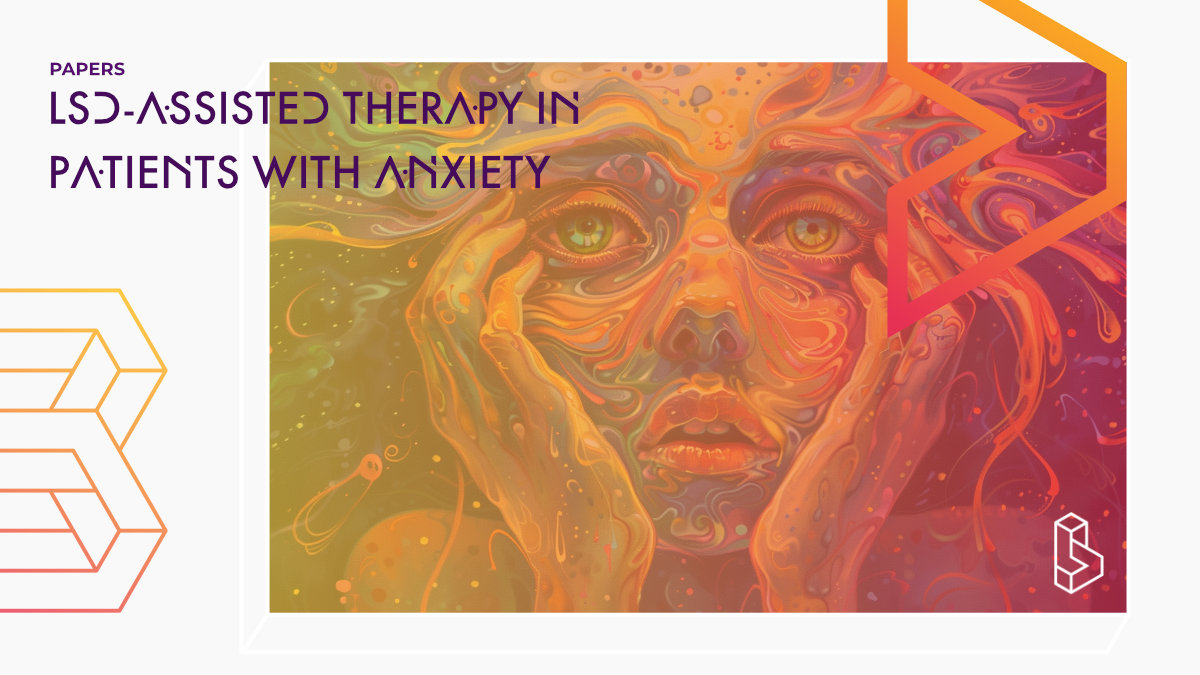This RCT follow-up study (n=39) investigates the long-term safety and efficacy of LSD-assisted therapy for anxiety (up to 94 weeks out). Participants reported a sustained reduction in anxiety (STAI-G; 33% remission) and depression (BDI; 49% remission) scores, decreased neuroticism, and increased extraversion, attributing positive long-term effects to the psychedelic experience.
Abstract of LSD-assisted therapy in patients with anxiety
“Background: Anxiety disorders are a major public health burden with limited treatment options.
Aims: We investigated the long-term safety and efficacy of lysergic acid diethylamide (LSD)-assisted therapy in patients with anxiety with or without life-threatening illness.
Method: This study was an a priori-planned long-term follow-up of an investigator-initiated, two-centre trial that used a double-blind, placebo-controlled, two-period, random-order, crossover design with two sessions with either oral LSD (200 μg) or placebo per period. Participants (n = 39) were followed up 1 year after the end-of-study visit to assess symptoms of anxiety, depression and long-term effects of psychedelics using Spielberger’s State-Trait Anxiety Inventory–Global (STAI-G), the Beck Depression Inventory (BDI), the Persisting Effects Questionnaire and measures of personality traits using the NEO-Five-Factor Inventory.
Results: Participants reported a sustained reduction of STAI-G scores compared with baseline (least square means (95% CI) = −21.6 (−32.7, −10.4), d = 1.04, P < 0.001, for those who received LSD in the first period (94 weeks after the last LSD treatment) and −16.5 (−26.2, −6.8), d = 1.02, P < 0.05, for those who received LSD in the second period (68 weeks after the last LSD treatment)). Similar effects were observed for comorbid depression with change from baseline BDI scores of −8.1 (−13.2, −3.1), d = 0.71, P < 0.01, and −8.9 (−12.9, −4.9), d = 1.21, P < 0.01, for the LSD-first and placebo-first groups, respectively. Personality trait neuroticism decreased (P < 0.0001) and trait extraversion increased (P < 0.01) compared with study inclusion. Individuals attributed positive long-term effects to the psychedelic experience.
Conclusions: Patients reported sustained long-term effects of LSD-assisted therapy for anxiety.”
Authors: Friederike Holze, Peter Gasser, Felix Müller, Manuel Strebel & Matthias E. Liechti
Summary of LSD-assisted therapy in patients with anxiety
Several recent trials showed that psychedelics, such as LSD and psilocybin, might have promise for the treatment of psychiatric illnesses, such as anxiety disorders and depression. It remains unclear, however, how long-lasting and sustained these symptom reductions are.
Psychedelics may also have effects on personality traits. Two recent studies in participants with major depressive disorder showed decreases in the personality domains neuroticism and introversion, and increases in openness.
Although initial results seem favourable for psychedelic-assisted therapy in people with anxiety disorders, gaps remain with regard to long-term safety and efficacy.
Find this paper
LSD-assisted therapy in patients with anxiety: open-label prospective 12-month follow-up
https://doi.org/10.1192/bjp.2024.99
Open Access | Google Scholar | Backup | 🕊
Cite this paper (APA)
Holze, F., Gasser, P., Müller, F., Strebel, M., & Liechti, M. E. (2024). LSD-assisted therapy in patients with anxiety: open-label prospective 12-month follow-up. The British Journal of Psychiatry, 1-9.
Study details
Topics studied
Anxiety
Depression
Personality
Study characteristics
Original Re-analysis
Longitudinal
Follow-up
Qualitative
Participants
39
Humans
Institutes
Institutes associated with this publication
University of BaselThe University of Basel Department of Biomedicine hosts the Liechti Lab research group, headed by Matthias Liechti.
Compound Details
The psychedelics given at which dose and how many times
LSD 200 μg | 2xLinked Research Papers
Notable research papers that build on or are influenced by this paper
Lysergic acid diethylamide-assisted therapy in patients with anxiety with and without a life-threatening illness A randomized, double-blind, placebo-controlled Phase II studyThis double-blind cross-over trial (n=42) finds that LSD (2x 200 μg) significantly reduced anxiety (STAI-G) scores up to three months after treatment. The patients, both with and without a life-threatening illness, also improved on measures of depression (HAM-D, BDI). Those with more subjective drug effects and mystical-type experiences had better outcomes.
Linked Clinical Trial
LSD Treatment in Persons Suffering From Anxiety Symptoms in Severe Somatic Diseases or in Psychiatric Anxiety DisordersTo test the efficacy of LSD in patients with anxiety with or without life-threatening diseases.

